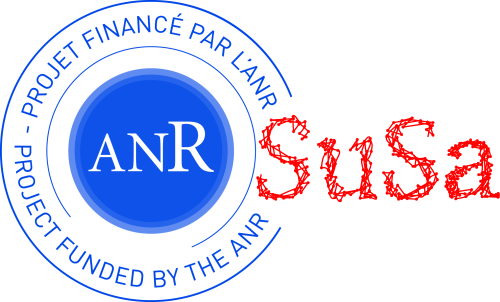On Future Synergies for Stochastic and Learning Algorithms
Sur les synergies futures autour des algorithmes d’apprentissage et stochastiques
27 September – 1st October 2021
|
Scientific Committee
Comité scientifique Arnaud Guillin (Université Clermont Auvergne) |
Organizing Committee
Comité d’organisation Alain Durmus (ENS-Paris Saclay) |
|
This workshop intends to gather computational statisticians, applied mathematicians and theoretical and computational physicists, working on the development and analysis of stochastic and learning algorithms. All these different fields revolve indeed around a probabilistic modelling, either of physical systems or data points, which are then completely characterised by a probability distribution. In physics, given the number of interacting objects is high enough, the system properties can indeed be casted into a Boltzmann distribution, whose corresponding potential function describes the interactions between the objects. In statistics, Bayesian inference replaces standard point-estimates of the parameters by a full probability distribution, which allows to take into consideration a priori information on the problem, but at the cost of having to deal with high-dimensional integrals. The goal is to strengthen the already known connections but more importantly to create new ones around Monte Carlo methods, Bayesian machine learning, probabilistic modelling, inverse problems, uncertainty quantification and applications to large-scale datasets in physics and statistics.
Our goal is to bring people from the different communities to discuss the practical and theoretical problems they face and their own take on them. For that purpose, the conference will be organized around 4 tutorial lectures, invited talks and contributed talks. Junior researchers (PhD and postdocs) are especially encouraged to participate to this event and additional funded accommodations have been planned, please contact the organizers if needed. Accommodation at CIRM adds up to ~500 euros for the full week. Contributions (posters, talks) are most welcome and should be made known at application. Depending on the volume pressure, we may have to apply a selection regarding the talk format, whose main goal will be to reflect the scientific themes not already covered by the invited presentations. |
Cette conférence a pour but de réunir des chercheurs en mathématiques, statistiques et physique théorique et computationnelle, travaillant sur le développement et l’analyse d’algorithmes stochastiques et d’apprentissage. Ces différents domaines ont pour point commun de se baser sur une modélisation probabiliste, que ce soit des systèmes physiques ou des jeux de données, qui sont alors complètement caractérisés par une distribution de probabilité. En physique, dès que le nombre d’objets en interaction est assez grand, les propriétés du système peuvent en effet être décrites par une distribution de Boltzmann, dont le potentiel traduit les interactions entre les objets. En statistique, l’approche bayésienne remplace l’estimation paramétrique ponctuelle par une distribution de probabilité sur l’espace des paramètres, ce qui permet de prendre en compte des informations a priori sur le problème, mais au prix de devoir traiter des intégrales de grande dimension. L’objectif est de renforcer les liens déjà connus, mais surtout d’en créer de nouveaux autour des méthodes de Monte Carlo, de l’apprentissage bayésien, de la modélisation probabiliste, des problèmes inverses, de la quantification de l’incertitude et des applications à des jeux de données à grande échelle en physique et en statistiques.
Notre objectif est que les chercheurs des différentes communautés discutent des problèmes pratiques et théoriques auxquels ils sont confrontés et de leur propre intuition des solutions possibles. À cet effet, la conférence sera organisée autour de 4 leçons, de présentations invitées et de présentations contribuées. Les jeunes chercheurs (doctorants et post-doctorants) sont particulièrement encouragés à participer à cet événement et des fonds ont été prévus pour financer l’hébergement pour un certain nombre d’entre eux, veuillez alors contacter les organisateurs si nécessaire. L’hébergement au CIRM s’élève à ~ 500 euros pour la semaine complète. Les contributions (posters, orales) sont les bienvenues et doivent être signalées lors de la candidature. En fonction de la pression, nous devrons appliquer une sélection quant au format oral, dont l’objectif principal sera de refléter les thèmes scientifiques non déjà couverts par les présentations invitées. |
Maria Chiara Angelini (Sapienza Università di Roma) Mismatching as a tool for MCMC
Ludovic Berthier (Université de Montpellier) MCMC for systems with glassy dynamics
Arnaud Doucet (University of Oxford) Diffusion Schrödinger Bridge with Applications to Score-Based Generative Modeling
Andreas Eberle (Bonn University) Convergence bounds for HMC in high dim.
Helmut Katzgraber (Microsoft Quantum) Combinatorial optimization with graph neural networks
Jan Kierfeld (TU Dortmund) Event-chain MC simulations of polymer systems
Tony Lelièvre (CERMICSÉcole des Ponts ParisTech) Algorithmes adaptatifs
Anthony Maggs (Université Paris Sciences & Lettres) Irreversible Monte Carlo methods
Murray Pollock (University of Warwick) Regeneration-enriched Markov processes with application to Monte Carlo
Beatriz Seoane (Universidad Complutense de Madrid) Biased Monte Carlo sampling in RBMs
Marija Vucelja ( University of Virginia) Nonreversible Markov chain Monte Carlo algorithm for efficient generation of Self-Avoiding Walks
Martin Weigel (Coventry University) Population annealing
Konstantinos Zygalakis (University of Edinburgh) Optimisation and Sampling Algorithms
Probabilistic modelling
Gérard Ben Arous (NYU Shanghai et Courant Institute of Mathematical Sciences)
Joan Bruna Estrach (New York University) Dual Training of Energy-Based Models with Overparametrized Shallow Neural Networks
Sebastian Goldt (SISSA) Data structure and learning dynamics in NN
Cris Moore (Santa Fe Institute) The statistical physics of permutations, rankings, and partial orders
Jonas Peters (University of Copenhagen) Exploiting Invariance: from Causal Discovery to Robust Prediction
Federico Ricci-Tersenghi (Sapienza University of Rome) Statistical mechanics of Bayesian inference
Grant Rotskoff (Stanford University) Adaptive Monte Carlo Augmented with Normalizing Flows
Umut Simsekli (INRIA) Heavy-Tailed Theory of SGD for DNN
Bayesian Learning
Remy Kusters (IBM Research) Interpretable deep learning models for physics
Youssef Marzouk (Massachusetts Institute of Technology) Simulation-based Bayesian inference using triangular transport
Simon Olsson (Chalmers University of Technology) Sampling conformational states of molecules with Boltzmann Generators
Marcelo Pereyra (Heriot Watt University) Bayesian inference with Plug Play priors by NN
Gabriel Stoltz (École des Ponts) Mini-batching error using Adaptive Langevin
Aretha Teckentrup (University of Edinburgh) Convergence and Robustness of Gaussian Process Regression
Jérôme Tubiana (Tel Aviv University) Biological systems with compositional RBM
Bayesian inference for physical data
Freddy Bouchet (ENS Lyon) Coupling rare event algorithms and deep neural network to predict extreme heat waves
Benjamin Fuks (Sorbonne Université) Beyond the Standard Model of particle physics
Shirley Ho (Flatiron Institute, Simons Foundation) Learning Symbolic Physics with Graph Networks
Guilhem Lavaux (CNRS, Sorbonne Université) BORG for cosmology
Thom Swinburne (CNRS, Centre Interdisciplinaire de Nanoscience de Marseille) Learning models for material microstructure
Contributed Talks
Stéphane Crépey (Université de Paris) Nowcasting Networks
Kamelia Daudel (Telecom Paris) Monotonic Alpha-divergence Minimisation
Bruno Loureiro (École Polytechnique Fédérale de Lausanne) Exactly solvable models for high-dim ML
Maxime Vono (Lagrange Research Center) Bayesian Federated Learning
Caroline Wormell (Sorbonne Université, CNRS) Operator convergence of diffusion maps







